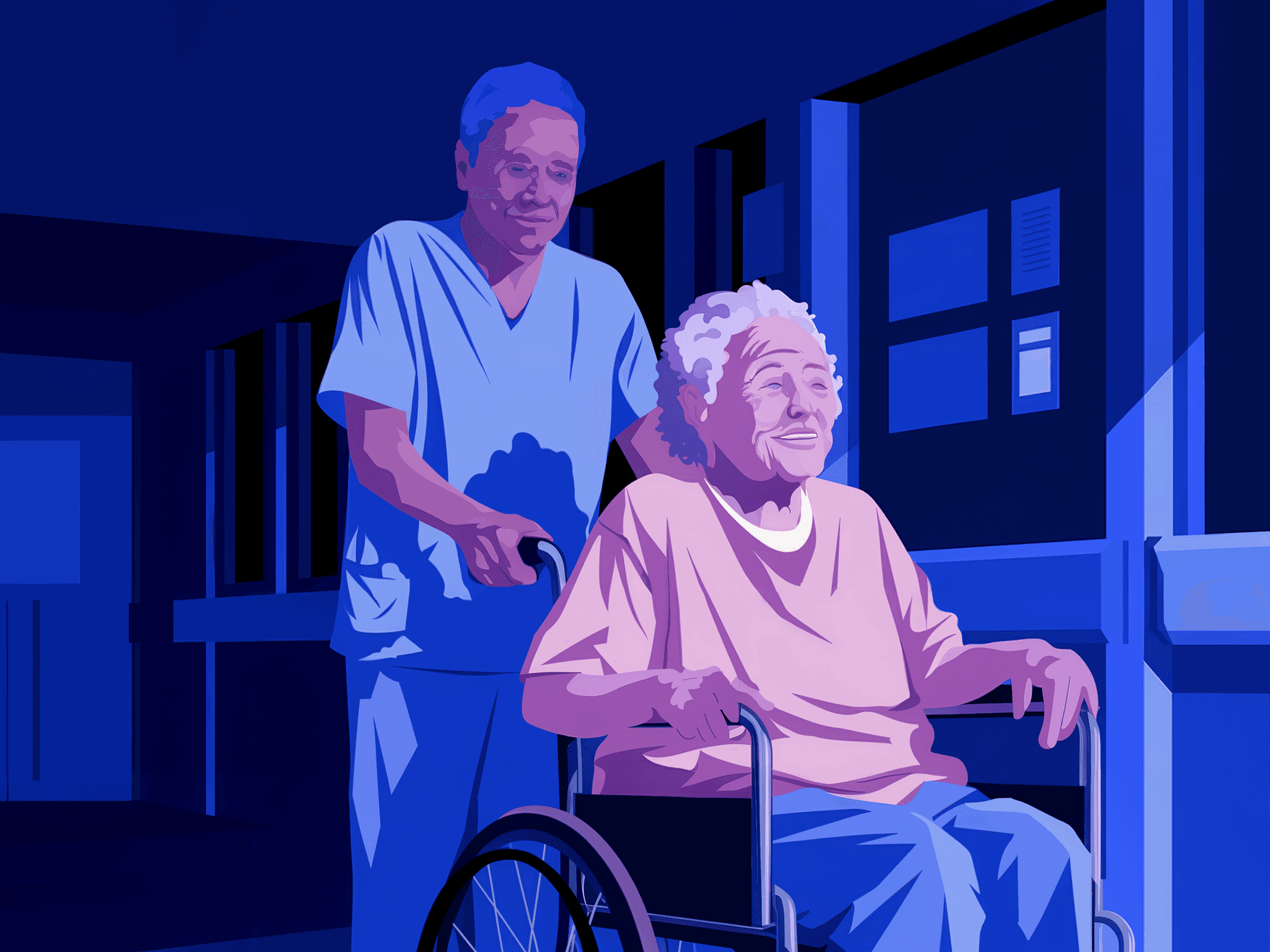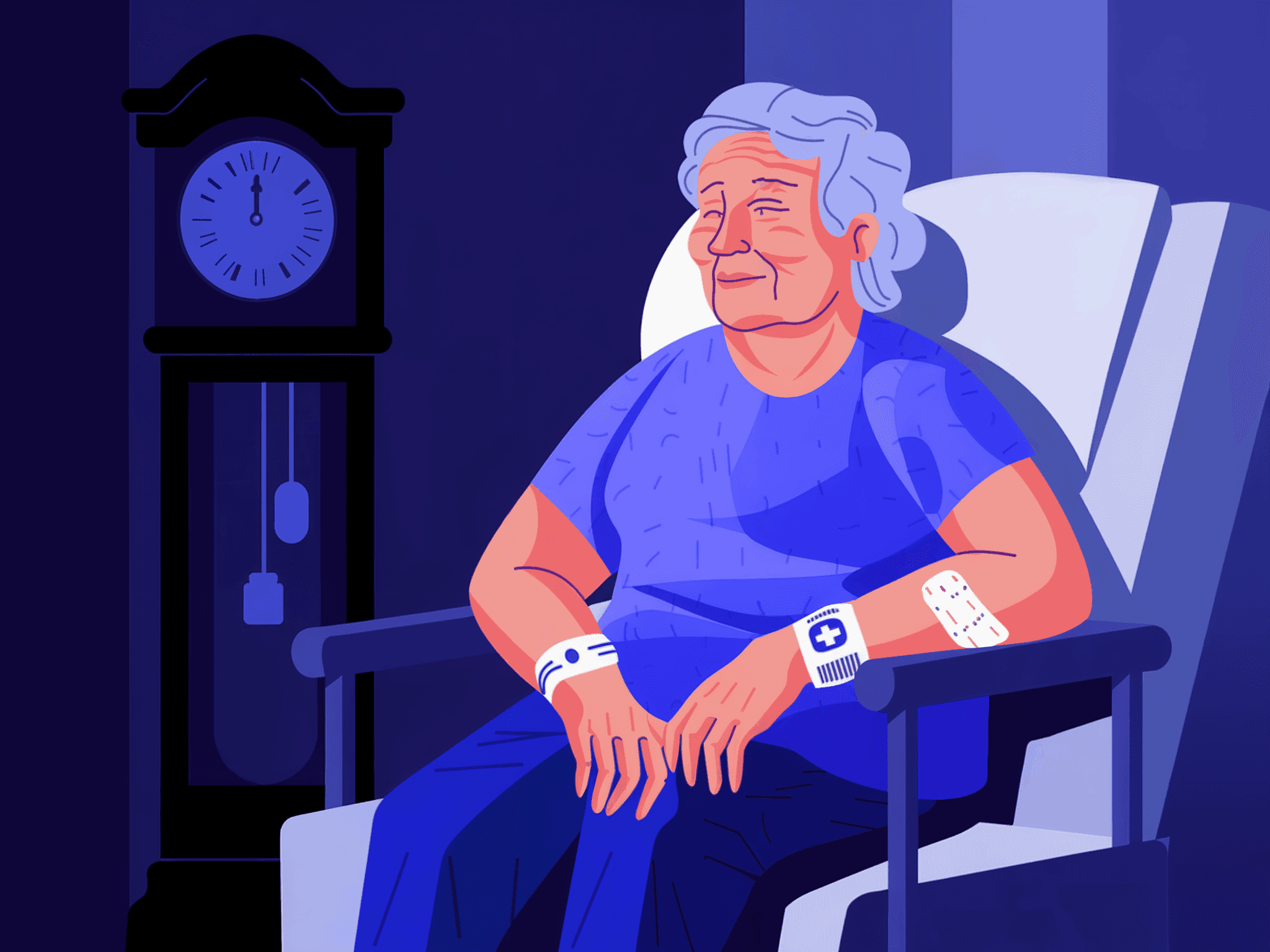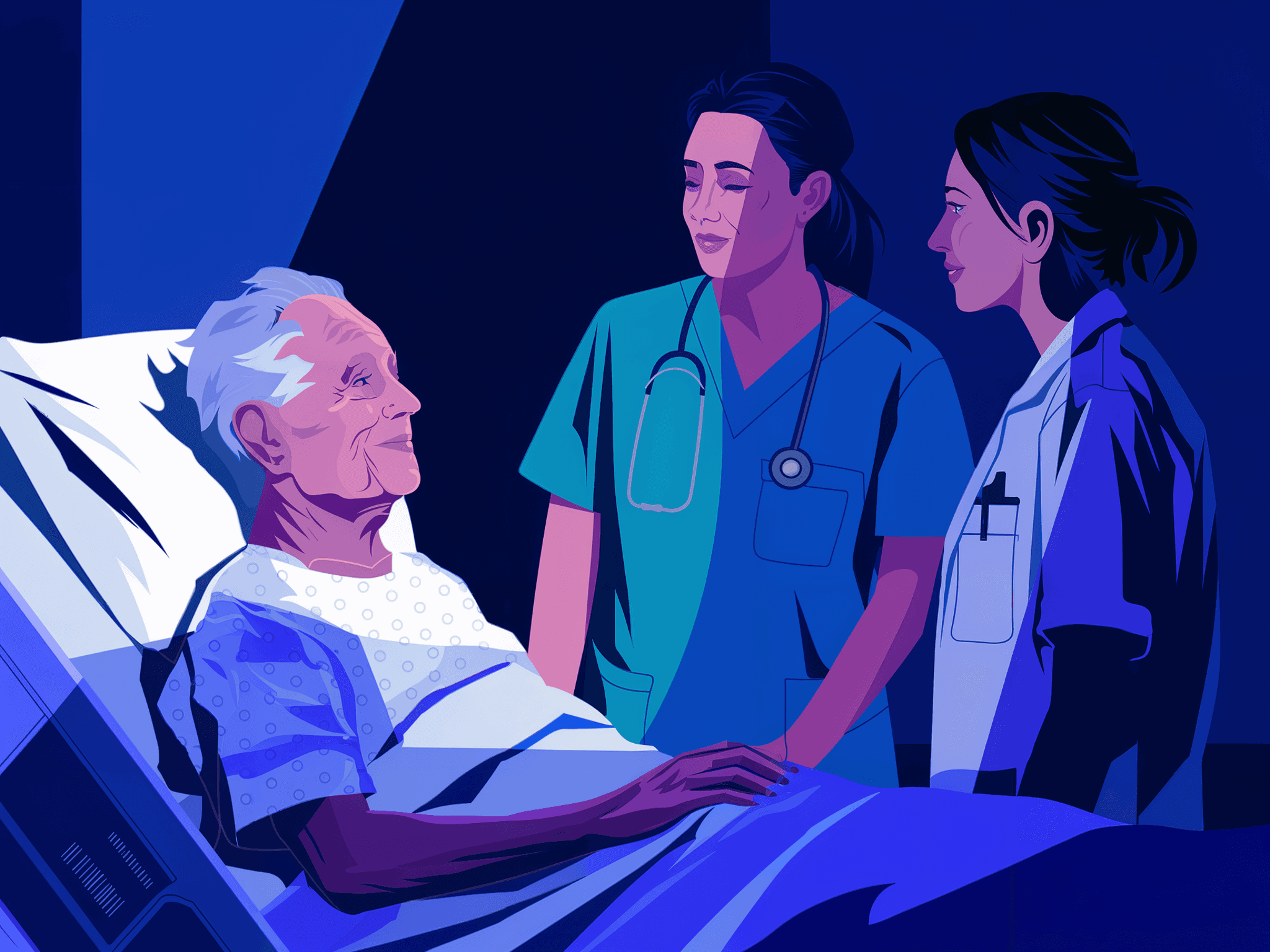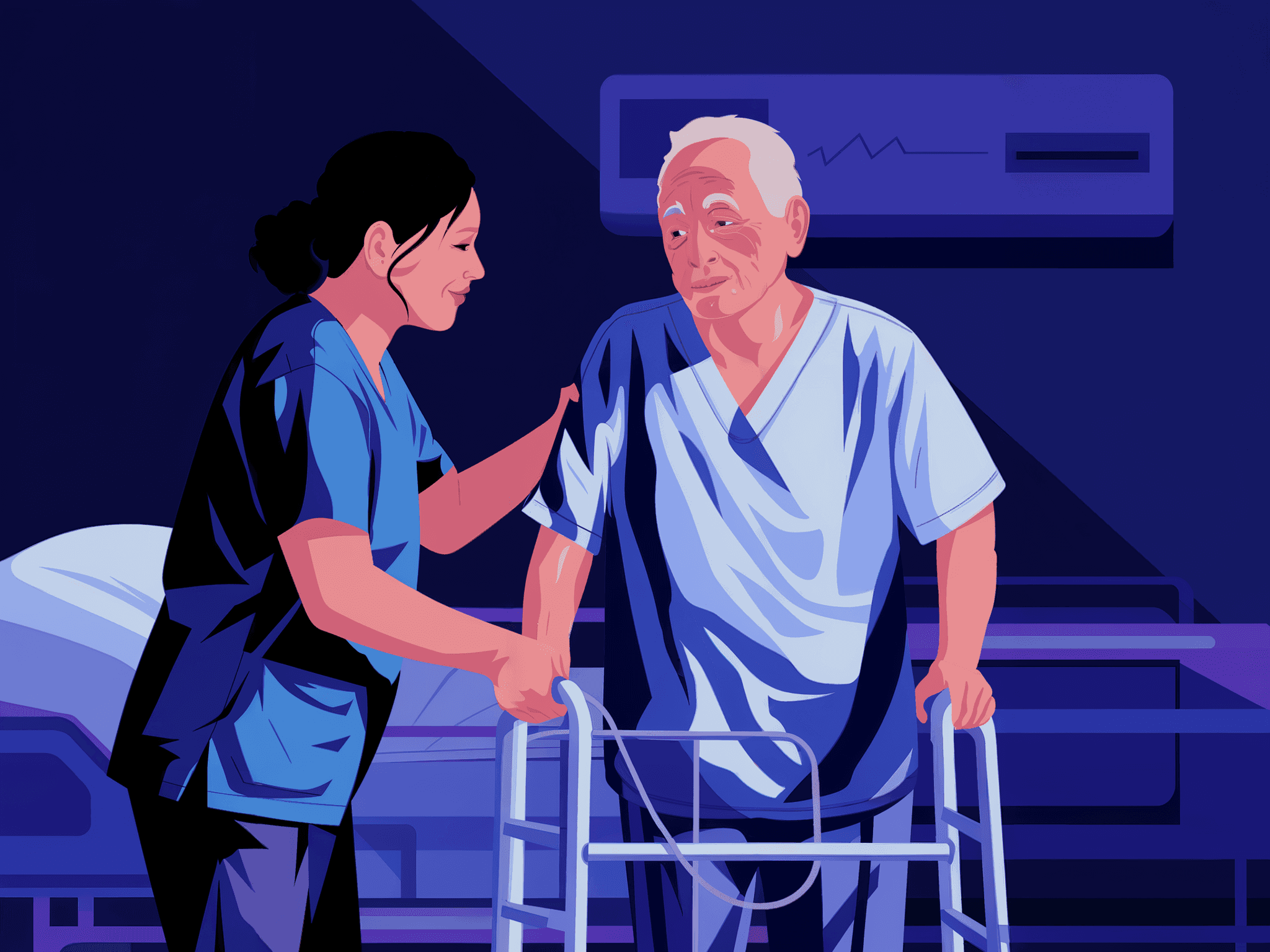SIBR® Rounds are the gold standard of patient-centered teamwork and care
Since 2011, we've been helping hospitals implement Structured Interdisciplinary Bedside Rounds – backed by 15 studies and refined from implementations at 80+ hospitals

SIBR® Rounds are the gold standard of patient-centered teamwork and care
Since 2011, we've been helping hospitals implement Structured Interdisciplinary Bedside Rounds – backed by 15 studies and refined from implementations at 80+ hospitals

SIBR® Rounds are the gold standard of patient-centered teamwork and care
Since 2011, we've been helping hospitals implement Structured Interdisciplinary Bedside Rounds – backed by 15 studies and refined from implementations at 80+ hospitals


What is SIBR? (pronounced "cyber")
Structured Interdisciplinary Bedside Rounds
The #1 model of interprofessional team rounds – research-backed, efficient, and patient-centered
A 6-step communication protocol to create a shared mental model of who says what, when, and in what sequence
Brings the Bedside Nurse, Physician, & Allied Health to the patient's bedside to synthesize mutually supported plans of care and discharge.
We implement, you get the glory.

What is SIBR? (pronounced "cyber")
Structured Interdisciplinary Bedside Rounds
The #1 model of interprofessional team rounds – research-backed, efficient, and patient-centered
A 6-step communication protocol to create a shared mental model of who says what, when, and in what sequence
Brings the Bedside Nurse, Physician, & Allied Health to the patient's bedside to synthesize mutually supported plans of care and discharge.
We implement, you get the glory.

What is SIBR? (pronounced "cyber")
Structured Interdisciplinary Bedside Rounds
The #1 model of interprofessional team rounds – research-backed, efficient, and patient-centered
A 6-step communication protocol to create a shared mental model of who says what, when, and in what sequence
Brings the Bedside Nurse, Physician, & Allied Health to the patient's bedside to synthesize mutually supported plans of care and discharge.
We implement, you get the glory.
Achievable Unit-Level Outcomes
A few sample results from 1Unit-led implementations
30%
reduction in
patient falls
95th
percentile average
HCAHPS scores
15.7%
average reduction in
length-of-stay
30%
reduction in 7-day
readmissions
Achievable Unit-Level Outcomes
A few sample results from 1Unit-led implementations
30%
reduction in
patient falls
95th
percentile average
HCAHPS scores
15.7%
average reduction in
length-of-stay
30%
reduction in 7-day
readmissions
Achievable Unit-Level Outcomes
A few sample results from 1Unit-led implementations
30%
reduction in
patient falls
95th
percentile average
HCAHPS scores
15.7%
average reduction in
length-of-stay
30%
reduction in 7-day
readmissions
The 90-Day Plan
We Implement. You Get The Glory.

Month 1
Establish Readiness
We come on-site to bring your physicians and staff on board, and we train unit co-leaders to own the change.
Month 2
Day 1 Launch
We train your staff and tailor tools to your needs.
Then we launch Structured Interdisciplinary Bedside Rounds, transforming your med-surg units or higher-dependency units.


Month 3+
Hardwire
We reduce variance and close skill gaps with a range of refined methods, like skills certification, targeted feedback, and leadership dashboards.
The 90-Day Plan
We Implement. You Get The Glory.

Month 1
Establish Readiness
We come on-site to bring your physicians and staff on board, and we train unit co-leaders to own the change.
Month 2
Day 1 Launch
We train your staff and tailor tools to your needs.
Then we launch Structured Interdisciplinary Bedside Rounds, transforming your med-surg units or higher-dependency units.


Month 3+
Hardwire
We reduce variance and close skill gaps with a range of refined methods, like skills certification, targeted feedback, and leadership dashboards.
The 90-Day Plan
We Implement. You Get The Glory.

Month 1
Establish Readiness
We come on-site to bring your physicians and staff on board, and we train unit co-leaders to own the change.
Month 2
Day 1 Launch
We train your staff and tailor tools to your needs.
Then we launch Structured Interdisciplinary Bedside Rounds, transforming your med-surg units or higher-dependency units.


Month 3+
Hardwire
We reduce variance and close skill gaps with a range of refined methods, like skills certification, targeted feedback, and leadership dashboards.
6 Proven SIBR Results
What's your top focus right now?
6 Proven SIBR Results
What's your top focus right now?
6 Proven SIBR Results
What's your top focus right now?
Get your custom implementation plan
Contact us to discuss a custom solution for your hospital.
Get your custom implementation plan
Contact us to discuss a custom solution for your hospital.
Get your custom implementation plan
Contact us to discuss a custom solution for your hospital.
Advanced Team Skills that SIBR brings to your Units
While many healthcare interventions aspirationally talk about advanced teams skills, we embed them into daily practice to create interprofessional collaboration.
Resilience
The dynamic ability of a team to recognize and respond to potential complications at an early stage.
Diagnostic Error Mitigation
Avoid unnecessary first impressions and missing subtle clinical declines suggesting misdiagnosis.
Standardization
Hardwiring evidence-based clinical practice to reduce unnecessary variation and improve predictability.
Orchestration
Collective competence where team members dynamically optimize effectiveness.
Shared Mental Models
A common understanding of the roles and responsibilities within a team.
Situational Awareness
Perceiving data, comprehending its significance, and projecting potential future states.
Common Ground
Team situational awareness where members share knowledge to coordinate interdependent tasks.
Cognitive Empathy
Proactively supporting colleagues when needed without having to be asked.
High Reliability
Delivering the right care to the right patient at the right time - every single time.
Cross-Checking
Exchanging team perspectives to enhance the accuracy of information.
Sense-Making
High comprehension of information due to consistent exchange sequences every time.
Clinical Inertia Prevention
Prevent teams from failing to initiate or intensify therapy when it is medically indicated.
Resilience
The dynamic ability of a team to recognize and respond to potential complications at an early stage.
Diagnostic Error Mitigation
Avoid unnecessary first impressions and missing subtle clinical declines suggesting misdiagnosis.
Standardization
Hardwiring evidence-based clinical practice to reduce unnecessary variation and improve predictability.
Orchestration
Collective competence where team members dynamically optimize effectiveness.
Shared Mental Models
A common understanding of the roles and responsibilities within a team.
Situational Awareness
Perceiving data, comprehending its significance, and projecting potential future states.
Common Ground
Team situational awareness where members share knowledge to coordinate interdependent tasks.
Cognitive Empathy
Proactively supporting colleagues when needed without having to be asked.
High Reliability
Delivering the right care to the right patient at the right time - every single time.
Cross-Checking
Exchanging team perspectives to enhance the accuracy of information.
Sense-Making
High comprehension of information due to consistent exchange sequences every time.
Clinical Inertia Prevention
Prevent teams from failing to initiate or intensify therapy when it is medically indicated.
Resilience
The dynamic ability of a team to recognize and respond to potential complications at an early stage.
Diagnostic Error Mitigation
Avoid unnecessary first impressions and missing subtle clinical declines suggesting misdiagnosis.
Standardization
Hardwiring evidence-based clinical practice to reduce unnecessary variation and improve predictability.
Orchestration
Collective competence where team members dynamically optimize effectiveness.
Shared Mental Models
A common understanding of the roles and responsibilities within a team.
Situational Awareness
Perceiving data, comprehending its significance, and projecting potential future states.
Common Ground
Team situational awareness where members share knowledge to coordinate interdependent tasks.
Cognitive Empathy
Proactively supporting colleagues when needed without having to be asked.
High Reliability
Delivering the right care to the right patient at the right time - every single time.
Cross-Checking
Exchanging team perspectives to enhance the accuracy of information.
Sense-Making
High comprehension of information due to consistent exchange sequences every time.
Clinical Inertia Prevention
Prevent teams from failing to initiate or intensify therapy when it is medically indicated.
Resilience
The dynamic ability of a team to recognize and respond to potential complications at an early stage.
Diagnostic Error Mitigation
Avoid unnecessary first impressions and missing subtle clinical declines suggesting misdiagnosis.
Standardization
Hardwiring evidence-based clinical practice to reduce unnecessary variation and improve predictability.
Orchestration
Collective competence where team members dynamically optimize effectiveness.
Shared Mental Models
A common understanding of the roles and responsibilities within a team.
Situational Awareness
Perceiving data, comprehending its significance, and projecting potential future states.
Common Ground
Team situational awareness where members share knowledge to coordinate interdependent tasks.
Cognitive Empathy
Proactively supporting colleagues when needed without having to be asked.
High Reliability
Delivering the right care to the right patient at the right time - every single time.
Cross-Checking
Exchanging team perspectives to enhance the accuracy of information.
Sense-Making
High comprehension of information due to consistent exchange sequences every time.
Clinical Inertia Prevention
Prevent teams from failing to initiate or intensify therapy when it is medically indicated.
Advanced Team Skills that SIBR brings to your Units
While many healthcare interventions aspirationally talk about advanced teams skills, we embed them into daily practice to create interprofessional collaboration.
Resilience
The dynamic ability of a team to recognize and respond to potential complications at an early stage.
Diagnostic Error Mitigation
Avoid unnecessary first impressions and missing subtle clinical declines suggesting misdiagnosis.
Standardization
Hardwiring evidence-based clinical practice to reduce unnecessary variation and improve predictability.
Orchestration
Collective competence where team members dynamically optimize effectiveness.
Shared Mental Models
A common understanding of the roles and responsibilities within a team.
Situational Awareness
Perceiving data, comprehending its significance, and projecting potential future states.
Common Ground
Team situational awareness where members share knowledge to coordinate interdependent tasks.
Cognitive Empathy
Proactively supporting colleagues when needed without having to be asked.
High Reliability
Delivering the right care to the right patient at the right time - every single time.
Cross-Checking
Exchanging team perspectives to enhance the accuracy of information.
Sense-Making
High comprehension of information due to consistent exchange sequences every time.
Clinical Inertia Prevention
Prevent teams from failing to initiate or intensify therapy when it is medically indicated.
Resilience
The dynamic ability of a team to recognize and respond to potential complications at an early stage.
Diagnostic Error Mitigation
Avoid unnecessary first impressions and missing subtle clinical declines suggesting misdiagnosis.
Standardization
Hardwiring evidence-based clinical practice to reduce unnecessary variation and improve predictability.
Orchestration
Collective competence where team members dynamically optimize effectiveness.
Shared Mental Models
A common understanding of the roles and responsibilities within a team.
Situational Awareness
Perceiving data, comprehending its significance, and projecting potential future states.
Common Ground
Team situational awareness where members share knowledge to coordinate interdependent tasks.
Cognitive Empathy
Proactively supporting colleagues when needed without having to be asked.
High Reliability
Delivering the right care to the right patient at the right time - every single time.
Cross-Checking
Exchanging team perspectives to enhance the accuracy of information.
Sense-Making
High comprehension of information due to consistent exchange sequences every time.
Clinical Inertia Prevention
Prevent teams from failing to initiate or intensify therapy when it is medically indicated.
Resilience
The dynamic ability of a team to recognize and respond to potential complications at an early stage.
Diagnostic Error Mitigation
Avoid unnecessary first impressions and missing subtle clinical declines suggesting misdiagnosis.
Standardization
Hardwiring evidence-based clinical practice to reduce unnecessary variation and improve predictability.
Orchestration
Collective competence where team members dynamically optimize effectiveness.
Shared Mental Models
A common understanding of the roles and responsibilities within a team.
Situational Awareness
Perceiving data, comprehending its significance, and projecting potential future states.
Common Ground
Team situational awareness where members share knowledge to coordinate interdependent tasks.
Cognitive Empathy
Proactively supporting colleagues when needed without having to be asked.
High Reliability
Delivering the right care to the right patient at the right time - every single time.
Cross-Checking
Exchanging team perspectives to enhance the accuracy of information.
Sense-Making
High comprehension of information due to consistent exchange sequences every time.
Clinical Inertia Prevention
Prevent teams from failing to initiate or intensify therapy when it is medically indicated.
Resilience
The dynamic ability of a team to recognize and respond to potential complications at an early stage.
Diagnostic Error Mitigation
Avoid unnecessary first impressions and missing subtle clinical declines suggesting misdiagnosis.
Standardization
Hardwiring evidence-based clinical practice to reduce unnecessary variation and improve predictability.
Orchestration
Collective competence where team members dynamically optimize effectiveness.
Shared Mental Models
A common understanding of the roles and responsibilities within a team.
Situational Awareness
Perceiving data, comprehending its significance, and projecting potential future states.
Common Ground
Team situational awareness where members share knowledge to coordinate interdependent tasks.
Cognitive Empathy
Proactively supporting colleagues when needed without having to be asked.
High Reliability
Delivering the right care to the right patient at the right time - every single time.
Cross-Checking
Exchanging team perspectives to enhance the accuracy of information.
Sense-Making
High comprehension of information due to consistent exchange sequences every time.
Clinical Inertia Prevention
Prevent teams from failing to initiate or intensify therapy when it is medically indicated.
Advanced Team Skills that SIBR brings to your Units
While many healthcare interventions aspirationally talk about advanced teams skills, we embed them into daily practice to create interprofessional collaboration.
Resilience
The dynamic ability of a team to recognize and respond to potential complications at an early stage.
Diagnostic Error Mitigation
Avoid unnecessary first impressions and missing subtle clinical declines suggesting misdiagnosis.
Standardization
Hardwiring evidence-based clinical practice to reduce unnecessary variation and improve predictability.
Orchestration
Collective competence where team members dynamically optimize effectiveness.
Shared Mental Models
A common understanding of the roles and responsibilities within a team.
Situational Awareness
Perceiving data, comprehending its significance, and projecting potential future states.
Common Ground
Team situational awareness where members share knowledge to coordinate interdependent tasks.
Cognitive Empathy
Proactively supporting colleagues when needed without having to be asked.
High Reliability
Delivering the right care to the right patient at the right time - every single time.
Cross-Checking
Exchanging team perspectives to enhance the accuracy of information.
Sense-Making
High comprehension of information due to consistent exchange sequences every time.
Clinical Inertia Prevention
Prevent teams from failing to initiate or intensify therapy when it is medically indicated.
Resilience
The dynamic ability of a team to recognize and respond to potential complications at an early stage.
Diagnostic Error Mitigation
Avoid unnecessary first impressions and missing subtle clinical declines suggesting misdiagnosis.
Standardization
Hardwiring evidence-based clinical practice to reduce unnecessary variation and improve predictability.
Orchestration
Collective competence where team members dynamically optimize effectiveness.
Shared Mental Models
A common understanding of the roles and responsibilities within a team.
Situational Awareness
Perceiving data, comprehending its significance, and projecting potential future states.
Common Ground
Team situational awareness where members share knowledge to coordinate interdependent tasks.
Cognitive Empathy
Proactively supporting colleagues when needed without having to be asked.
High Reliability
Delivering the right care to the right patient at the right time - every single time.
Cross-Checking
Exchanging team perspectives to enhance the accuracy of information.
Sense-Making
High comprehension of information due to consistent exchange sequences every time.
Clinical Inertia Prevention
Prevent teams from failing to initiate or intensify therapy when it is medically indicated.
Resilience
The dynamic ability of a team to recognize and respond to potential complications at an early stage.
Diagnostic Error Mitigation
Avoid unnecessary first impressions and missing subtle clinical declines suggesting misdiagnosis.
Standardization
Hardwiring evidence-based clinical practice to reduce unnecessary variation and improve predictability.
Orchestration
Collective competence where team members dynamically optimize effectiveness.
Shared Mental Models
A common understanding of the roles and responsibilities within a team.
Situational Awareness
Perceiving data, comprehending its significance, and projecting potential future states.
Common Ground
Team situational awareness where members share knowledge to coordinate interdependent tasks.
Cognitive Empathy
Proactively supporting colleagues when needed without having to be asked.
High Reliability
Delivering the right care to the right patient at the right time - every single time.
Cross-Checking
Exchanging team perspectives to enhance the accuracy of information.
Sense-Making
High comprehension of information due to consistent exchange sequences every time.
Clinical Inertia Prevention
Prevent teams from failing to initiate or intensify therapy when it is medically indicated.
Resilience
The dynamic ability of a team to recognize and respond to potential complications at an early stage.
Diagnostic Error Mitigation
Avoid unnecessary first impressions and missing subtle clinical declines suggesting misdiagnosis.
Standardization
Hardwiring evidence-based clinical practice to reduce unnecessary variation and improve predictability.
Orchestration
Collective competence where team members dynamically optimize effectiveness.
Shared Mental Models
A common understanding of the roles and responsibilities within a team.
Situational Awareness
Perceiving data, comprehending its significance, and projecting potential future states.
Common Ground
Team situational awareness where members share knowledge to coordinate interdependent tasks.
Cognitive Empathy
Proactively supporting colleagues when needed without having to be asked.
High Reliability
Delivering the right care to the right patient at the right time - every single time.
Cross-Checking
Exchanging team perspectives to enhance the accuracy of information.
Sense-Making
High comprehension of information due to consistent exchange sequences every time.
Clinical Inertia Prevention
Prevent teams from failing to initiate or intensify therapy when it is medically indicated.








